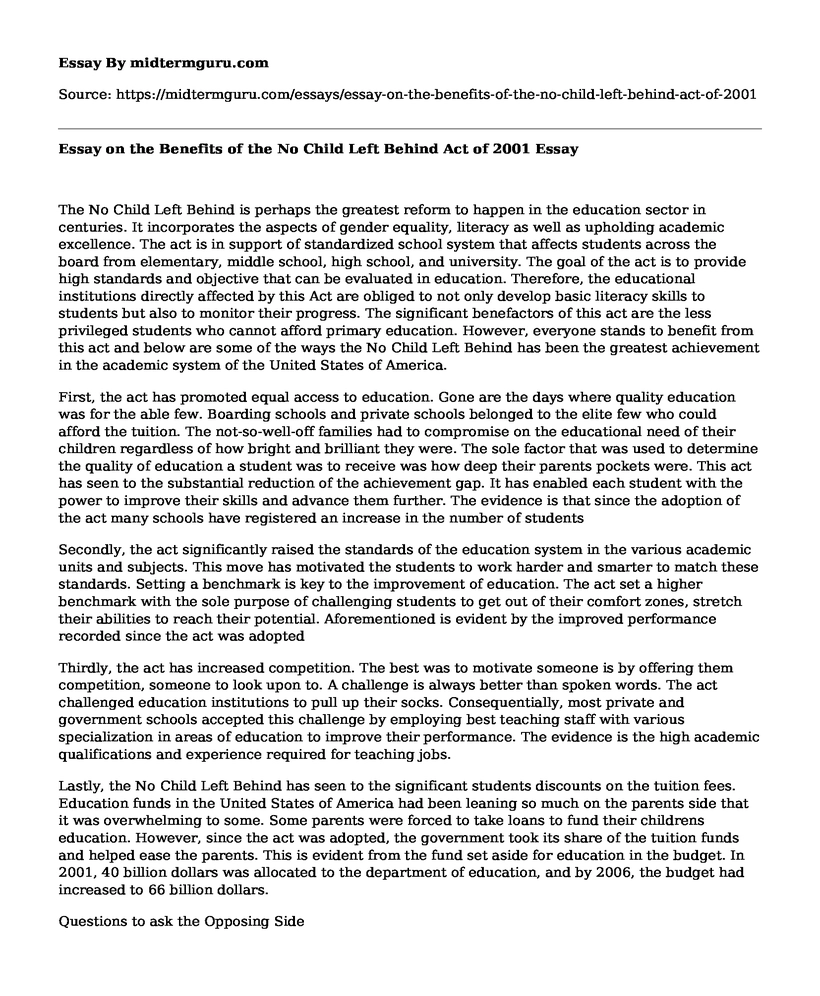The No Child Left Behind is perhaps the greatest reform to happen in the education sector in centuries. It incorporates the aspects of gender equality, literacy as well as upholding academic excellence. The act is in support of standardized school system that affects students across the board from elementary, middle school, high school, and university. The goal of the act is to provide high standards and objective that can be evaluated in education. Therefore, the educational institutions directly affected by this Act are obliged to not only develop basic literacy skills to students but also to monitor their progress. The significant benefactors of this act are the less privileged students who cannot afford primary education. However, everyone stands to benefit from this act and below are some of the ways the No Child Left Behind has been the greatest achievement in the academic system of the United States of America.
First, the act has promoted equal access to education. Gone are the days where quality education was for the able few. Boarding schools and private schools belonged to the elite few who could afford the tuition. The not-so-well-off families had to compromise on the educational need of their children regardless of how bright and brilliant they were. The sole factor that was used to determine the quality of education a student was to receive was how deep their parents pockets were. This act has seen to the substantial reduction of the achievement gap. It has enabled each student with the power to improve their skills and advance them further. The evidence is that since the adoption of the act many schools have registered an increase in the number of students
Secondly, the act significantly raised the standards of the education system in the various academic units and subjects. This move has motivated the students to work harder and smarter to match these standards. Setting a benchmark is key to the improvement of education. The act set a higher benchmark with the sole purpose of challenging students to get out of their comfort zones, stretch their abilities to reach their potential. Aforementioned is evident by the improved performance recorded since the act was adopted
Thirdly, the act has increased competition. The best was to motivate someone is by offering them competition, someone to look upon to. A challenge is always better than spoken words. The act challenged education institutions to pull up their socks. Consequentially, most private and government schools accepted this challenge by employing best teaching staff with various specialization in areas of education to improve their performance. The evidence is the high academic qualifications and experience required for teaching jobs.
Lastly, the No Child Left Behind has seen to the significant students discounts on the tuition fees. Education funds in the United States of America had been leaning so much on the parents side that it was overwhelming to some. Some parents were forced to take loans to fund their childrens education. However, since the act was adopted, the government took its share of the tuition funds and helped ease the parents. This is evident from the fund set aside for education in the budget. In 2001, 40 billion dollars was allocated to the department of education, and by 2006, the budget had increased to 66 billion dollars.
Questions to ask the Opposing Side
1. If it were not for the act, could the parents have afforded over 26 billion funds allocated to the department of education? (Hardly possible)
2. Are there students who deserve access to education more than others? (No, the Acts supports equality)
3. The act raised the standards of education. Is there a student who desires to acquire the low-quality education? (No, every students desires to be a top achiever)
4. Some may argue that the Act favors the intelligent. Should that be a reason to compromise on the quality of education? (No, the government in partnership should purpose to give the best quality education)
5. There are academic challenges associated with the act. Is that a good enough reason not to pursue quality education? (No, the government in partnership should purpose to give the best quality education)
6. It is apprehended that a great teacher can help his/her students escape poverty in future. How true would this be if the quality of education was poor? (Hardly possible, yet the Act has made it possible)
7. In an economy where the employers are looking for the most skilled workers, is there such as thing as too high standards when it comes to education? (No, the better informed the qualified the workers, the better the services they provide)
8. A students primary task is academic excellence, and the act promotes high standards. Is that not in line with students aspirations? (It is, every students desires to be a top achiever and the Act sees to this)
9. Do the cons outweigh the pros of the act? (No, the Act has significantly improved education)
10. What are the significant disadvantages associated with the Act? (Nothing that cannot be finessed)
Cite this page
Essay on the Benefits of the No Child Left Behind Act of 2001. (2021, Jun 03). Retrieved from https://midtermguru.com/essays/essay-on-the-benefits-of-the-no-child-left-behind-act-of-2001
If you are the original author of this essay and no longer wish to have it published on the midtermguru.com website, please click below to request its removal:
- Essay Sample on Sociological Causes of Crimes
- Paper Example on Nationwide Death Penalty Policy
- Paper Example on Protecting the Youth From Challenges of Stop and Search Policies
- Essay Sample on Parent-Child Relationships
- Adolescent Diversion Program and Six Sights Program - Essay Sample
- Essay Sample on Autonomy of Citizens of China and US
- Fighting Cybercrime: Overcoming the Law's Enforcement Gap - Essay Sample







